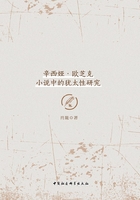
Abstract
The present study addresses Jewishness and its literary representation in Cynthia Ozick's fiction,taking her thirteen stories,three novellas and five novels as the samples.
The samples represent the panoramic scene of Ozick's fiction creation in terms of both production phase and work length. The earliest was created in 1966 while the latest in 2004. These samples are as follows—the thirteen stories:“The Dock-Witch”(1971),“The Doctor's Wife”(1971),“The Suitcase”(1971),“Virility”(1971),“The Pagan Rabbi”(1971),“A Mercenary”(1976),“Bloodshed”(1976),“Usurpation (Other People's Stories)”(1976),“Shots”(1982),“Levitation”(1982),“Puttermesser:Her Work History,Her Ancestry,Her Afterlife”(1982),“The Shawl” (1989) and “Puttermesser in Paradise”(1997);the three novellas:Puttermesser and Xanthippe (1982),Rosa (1989) and The Shawl (1989);and the five novels:Trust (1966),The Cannibal Galaxy (1983),The Messiah of Stockholm (1987),The Puttermesser Papers (1997) and Heir to the Glimmering World (2004).
On the basis of a close reading of Ozick's essays and the sample fictional texts,the study employs Diasporic vision,Feminist and New Historicist perspectives and postmodernist narrative studies and aims to examine the uniqueness in Jewishness and its literary representation in Ozick's fiction together with her inheritance and development of the Jewish tradition in representing Jewishness in contemporary Jewish American fiction.
First,Jewishness and its literary representation in Cynthia Ozick's fiction is put in the context of contemporary Jewish American fiction and Jewishness representation. Attempting to disclose the major characteristics of Jewishness representation in Ozick's fiction,the study first traces the development of Jewish American literature and examines in particular the contemporary Jewish American fiction from the 1950s to the 21st century,for that is the background in which Ozick's Jewishness is nurtured. The features that chronologically distinguish contemporary Jewishness are summarized as moral ethos,Judaism engagement,and loyalty to fact in Holocaust representation,which stands independent respectively. The study thus locates Ozick and her Jewishness representation in the history of contemporary Jewish American fiction and argues that Ozick has inherited and enriched contemporary Jewishness representation.
Second,the study focuses upon the uniqueness in Jewishness and its literary representation in Ozick's fiction on the basis of the examination of Ozick's vision of literary creation,her understanding of history and nature,and her insight of the essence of femininity. Ozick's literary representation of these ideals in her fictional texts is analyzed and interpreted in detail.
In the analysis and interpretation of Ozick's textual representation of her visions pertinent to literary creation,history,nature,and femininity,attention is paid to the link between Ozick's fiction creation and the Jewish way of thinking. Threekey conflicts prevailing in Ozick's fiction are studied,namely,first,the conflict between Judaic ethics and aesthetic practice,or specifically the anxiety of creation over whether to create or not to create;second,the conflict between Pan representing hostland non-Jewish culture and Moses representing homeland Jewish culture,or specifically history writing and nature writing in the Diasporic context;third,the conflict between Feminist vision and the Orthodox Judaic gender law prohibiting women from acting as intellectual equals to men,or specifically characterization of female characters. The study elaborates on Ozick's unique Jewishness representation resulting from her practice in dialectically presenting and resolving these conflicts with Pilpul,the Jewish logic,and L'Chaim,the Jewish principle,in her fictional texts.
Attention is also paid to the link between Ozick's fiction creation and the Jewish cultural legacy,which is another embodiment of Ozick's unique Jewishness representation. The study interprets how Ozick has drawn upon Midrash,the Jewish legacy in Biblical interpretation,in presenting Midrashic literary interpretation of Jewish standpoint including anti-idolatry,Jewish views including tikkun olam and arevut,and in presenting Midrashic literary representation of Jewish history including the Holocaust.
The study is intended to decode Jewishness and its representation in Ozick's fiction from a gentile perspective in hopes to get access to the Jewish way of thinking and the Jewish cultural legacy,however the authentically Jewish nature of Ozick's fiction calls for the employment of such Jewish concepts as the Kabbalistic thought and the golem legend,etc. in addition to Pilpul,L'Chaim,Midrash,anti-idolatry,tikkun olam and arevut . Meanwhile,the use of such postmodernist literary narrative as heteroglossia,polyphonic narrative,metafictional intrusion narrative,writing degree zero,and intertextualityis elaborated and their significance in enabling Ozick to stay Jewish is analyzed respectively. In addition,such sociological ideas as essentialismand social constructionismare brought into discussion as well. These discussions provide a necessary foundation for the interpretation of Ozick's imagination and Jewishness representation.
The study attempts to promote Ozick reception as a result of the interpretation of her fictional works on the basis of the examination of her vision of literary creation,her understanding of history and nature,and her insight of the essence of femininity. In addition,the study is expected to present an example of ethnicity representation in literary works on the basis of the exploration into Ozick's literary representation of Jewishness in her fiction.
Key words:Jewishness;Pilpul;Dialectic;Midrash